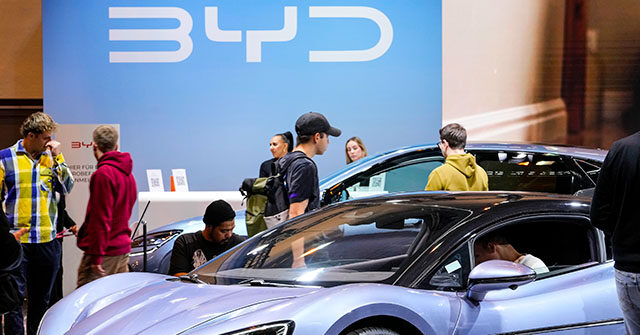We support our Publishers and Content Creators. You can view this story on their website by CLICKING HERE.

Chinese state media is celebrating automaker BYD surpassing Elon Musk’s Tesla as the world’s top producer of electric vehicles (EVs), while downplaying reports that BYD has been keeping its Brazilian workforce in conditions “analogous to slavery.”
China’s state-run Global Times on Friday reported that BYD production surpassed that of Tesla in 2024, although Tesla still holds the lead in sales by a little under 30,000 units.
BYD sales surged by 41.3 percent in 2024, according to the company’s year-end financial statements, while Tesla’s sales slipped by 1.1 percent, marking its first annual sales decline since 2011.
Although it manufactures its automobiles in several countries, the vast majority of BYD’s sales are in China. BYD is not the only Chinese EV maker, but it is the largest by a substantial margin.
The Global Times made much of BYD’s “deliveries” outpacing Tesla sales in the fourth quarter, BYD production climbing to 1.778 million units in 2024 to surpass Tesla’s 1.770 million, and BYD overtaking Tesla in annual revenue for the first time.
“This reveals the growing competitiveness of Chinese NEVs [new energy vehicles] and their popularity in global markets, which is based on technological advances and supply-chain advantages,” the Chinese Communist paper gushed.
“NEV” is a term China coined to encompass cars that get most of their energy from electric power, an expansive definition that includes hybrids and hydrogen fuel-cell vehicles (HFCV).
HFCVs are very rare in the United States at the moment and are found mostly in California. They require users to pump the vehicle full of hydrogen the same way gas-powered vehicles require gasoline, but hydrogen pumps are extremely rare and, unlike electric vehicles, they cannot be charged at home. HFCVs are far more popular in China, which surpassed South Korea as the top market for hydrogen vehicles in 2024.
Of course, the competitive advantage the Global Times and its stable of analysts does not want to talk about is BYD’s habit of keeping workers in near-slavery conditions to cut labor costs. The government of Brazil stopped issuing work visas for BYD last week after hundreds of the company’s imported Chinese workers were found living in unsanitary dormitories and working under “degrading” conditions.
Among other abuses, Brazilian investigators found BYD employees were stripped of their passports and forced to kick back 60 percent of their wages to their contractor, the Jinjiang Group. Brazilian prosecutors described the workers as victims of “international human trafficking.”
Another Global Times report on Thursday announced that Chinese companies now control 70 percent of NEV sales worldwide, spiking to 76 percent of global sales in the last quarter of 2024.
“The robust performance by China stands in contrast with lackluster NEV performance in the EU and U.S. markets against the backdrop of slowing global NEV growth highlighted by increased supply of fuel-powered cars, depletion in potential EV buyers and worries by mainstream consumers over charging infrastructure, battery life and insurance costs,” China Passenger Car Association Secretary-General Cui Dongshu said.
“BYD sales in December were boosted by an ongoing government automobile trade-in program, which benefits domestic and foreign brands in China alike. Nearly 2.7 million vehicles have been scrapped and replaced nationwide, with 3.1 million having been traded in as of December 19,” the Chinese Ministry of Commerce said.
The Global Times quoted the International Energy Agency (IEA) estimate that worldwide electric vehicle sales must reach 45 million units by 2030 to “realize carbon neutrality.” That would require more than triple the current annual EV sales of about 14 million.
China loves to tout its government-supported EV boom as evidence that Beijing is acting as a responsible partner on climate change, but in fact China remains the world’s worst polluter by a very wide margin and is particularly stubborn about burning gigantic amounts of coal for electric power. No level of electric vehicle sales could come anywhere close to offsetting the carbon China pumps into the atmosphere, but criticism of Communist China by the worldwide climate movement tends to be very muted.

 Conservative
Conservative  Search
Search Trending
Trending Current News
Current News 







